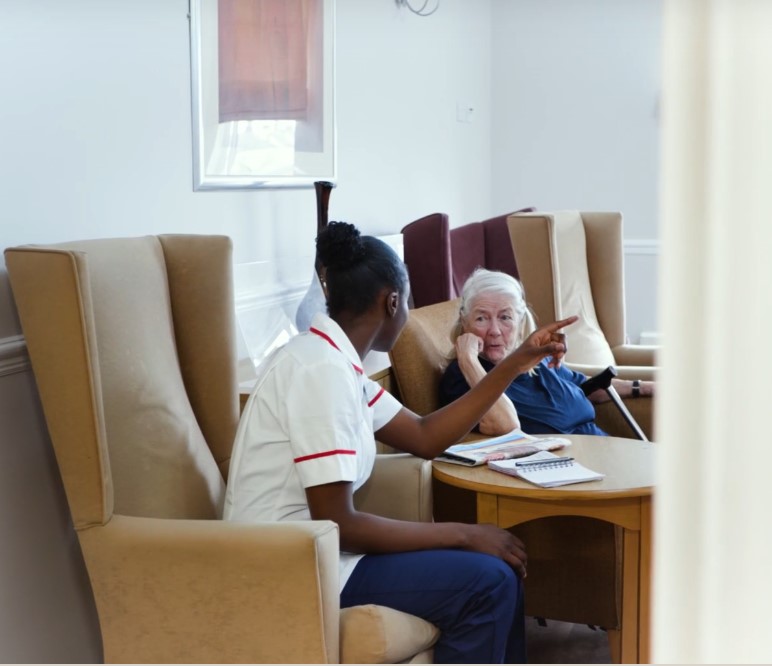At Azalea Court, Julie Burton has transformed resident care management by focusing on sleep patterns and resource optimisation. By integrating the Ally Cares system, alongside Nourish and PainChek, Julie is able to make data-driven decisions that benefit both residents and her care team. This approach enhances resident well-being while strengthening relationships with Integrated Care Boards (ICBs), ensuring funding is used efficiently and ethically.
Data-driven care: Optimising resident well-being
Julie’s care strategy at Azalea Court is built on real-time data collection, particularly concerning residents’ sleep patterns. The Ally Cares system allows her team to track sleep changes, identify unassisted interactions, and make informed adjustments to care as necessary.
“Sleep is absolutely crucial for the overall health and recovery of our residents,” says Julie. “We use Ally Cares to monitor any changes in sleep patterns, and it alerts us when someone needs assistance, allowing us to focus on those who need it most, especially at night when staffing is lower.”
With the data Ally Cares collects, Julie is able to take proactive steps to adjust care plans. For instance, if a resident exhibits increased agitation or fidgeting, her team can intervene before the situation worsens. “It’s not just about waiting for problems to arise,” she explains. “We can act on trends, like sleep disturbances, to make adjustments before they impact the resident’s health.”
Building trust with ICBs through transparency
One of the significant benefits of using Ally Cares is the transparency it provides in care data, supporting one-to-one care funding applications. Julie uses the data collected by Ally, along with Nourish, to demonstrate when additional support is necessary—and when it isn’t. This ethical approach has helped her build strong, long-term relationships with ICBs.
“I always promise the ICBs that I will monitor and review every resident’s care needs,” Julie explains. “For example, if a resident sleeps through the night without needing assistance, I can clearly show that we don’t need one-to-one care during those hours. This kind of transparency is what builds trust.”
Julie ensures that funding is allocated where it’s needed most, and if a resident’s condition improves, she promptly reduces or removes unnecessary funding. “It’s not about keeping funding for the sake of it,” she adds. “It’s about showing the ICBs that we’re using their resources wisely, and if a resident gets better, we reduce the care accordingly. This helps build long-term trust, which is invaluable.”
Improving sleep monitoring to enhance quality of life
Julie’s decision to implement Ally Cares was based on her belief that sleep is a fundamental aspect of residents’ well-being. The system alerts her team when residents wake up or show signs of distress, enabling timely intervention.
“When I’ve been in hospital, I know how hard it is to sleep,” Julie recalls. “For our residents, improving sleep quality can have a massive impact on their health and recovery. If we know someone’s having trouble sleeping, we can adapt their care plan, whether that’s adjusting medication, routines, or providing more comfort.”
By focusing on sleep, Julie adopts a holistic approach to care. “We don’t just want residents to exist here—we want them to thrive,” she says. “By concentrating on their sleep, we’re able to improve their quality of life significantly.”
Maximising staff resources for targeted care
Another major advantage of using Ally Cares at Azalea Court is the ability to optimise staff resources. With data showing which residents are sleeping soundly, Julie can direct her team’s attention to those in need, rather than conducting unnecessary checks.
“Our night staff is smaller than the day team, so it’s important to use them efficiently,” Julie explains. “If Ally Cares tells us that Mrs Smith is sleeping through the night without issue, we can focus on other residents who might need more care. It means our team isn’t running around all night and can provide more targeted support.”
This approach has improved the working environment for staff, reducing stress and enhancing the quality of care. “The staff feel less stretched because they’re not constantly checking on residents who don’t need it,” she says.
A collaborative future for care
Julie’s use of Ally Cares and other digital tools reflects a broader vision for the future of care at Azalea Court. She believes that by embracing technology, care homes can achieve better outcomes for residents while maximising resources and strengthening relationships with healthcare partners.
“We’re in a unique position where technology like Ally Cares can make a real difference to both residents and staff,” Julie says. “It’s about more than just managing day-to-day care—it’s about creating a long-term strategy that benefits everyone involved.”
As Julie continues to innovate and integrate new systems, her focus remains on delivering the best possible care for her residents. “At the end of the day, it’s about ensuring that our residents are happy, healthy, and thriving,” she concludes. “And Ally Cares is helping us achieve that every day.”
Contact us today to discuss how we can help you to dramatically enhance your residents’ well-being and care outcomes.

